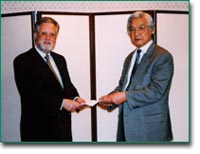  |
 |
 |
The Second BAC Held |
 |
The 2nd Brain Science Advisory Council (BAC) for obtaining optimum advice and suggestion in support of the management, orientation and progress of the BSI was held from March 17 to 19, 1999. (The council was chaired by Dr. Michel Cuenod, Secretary-General, Human Frontier Science Program.)
The first day agenda included member's visits to laboratories relating to their specialized fields, interviews with researchers and receiving reports of BSI activities of the past year.
|
|
On the second day, the research groups presented reports on the progress of their research, outlined their future research programs and accepted the visiting scientists in the laboratories, where discussions were held and questions answered. Overall discussions among the participants in the council and the compilation of a report took up the final day. The report that was compiled evaluates highly the speedy and positive implementation of the large number of proposals made by the BAC during 1998, these included the establishment of new research laboratories, the holding of retreats, forums and seminars, and the recruitment of overseas researchers.
A summary of the report contents follows:
|
 |

Prof. Michel Cuenod handing the report to Dr. M. Ito
|
- Structure. The nature of the responsibility of the group directors must be defined, both with respect to the recruitment procedure and for on-going mentoring of the research of the laboratories under their guidance. The independence of the separate laboratories must however be preserved.
- Recruitment. The recruitment procedure for laboratory or group leaders should be formalized and standardized as rapidly as possible. The search committee may seek the opinions of established external experts, for example from other Japanese institutions.
- Appointment. Among the criteria for the appointment of new laboratory or group leaders, should figure, beside scientific excellence, a coherence with present expertise and a proven interest in brain mechanisms. It is important that the required critical mass of researchers is available in each field being pursued, rather than following up all possible fields.
- Monitoring. While the independence of the Laboratories is to be maintained, progress and coherence should be monitored regularly so that timely correction can be made
- Human Genome project. It will be important for BSI to be well positioned to understand the function of the large numbers of new genes specific to brain function. Exploiting the Genome Project development can be done through recruiting at BSI within the current groups a new generation of well-trained cell biologists.
|
 |
 |
Laboratory for Molecular Psychiatry Started |
 |
New laboratories are established in BSI as the need arises. In April 1999, new Aging and Psychiatric Research Group was launched and two laboratories belonging to Molecular Neuropathology Group were accommodated within the new group. In May, the Laboratory for Molecular Psychiatry (Head, Dr. Takeo Yoshihara) was also started as a third laboratory in this group. The laboratory will conduct studies aiming at genetic causes of mental diseases affecting the higher neural functions, such as schizophrenia and manic-depressive psychoses.
These studies will be focused on finding the DNA sequence variations relevant to the predispositions to these diseases. Several studies have reported the mapping of the susceptibility regions in the chromosomes, however, none of these have not been narrowed down to positionally clonable sizes because of the complex nature of the diseases. The laboratory is setting out to identify the susceptibility genes (hazard factors) by incorporating the progress of the Human Genome Project and outcome of other peripheral sciences.
|
 |
 |
The BSI Central Building (1st Phase) Completed |
 |
The first phase of the construction of the BSI Central Building was completed in April. The building has a basement and nine floors above ground (44m in height). Its total floor area is 15,500m2, making it RIKEN's highest building on the Wako campus. Previously established BSI laboratories and other new laboratories, totaling thirteen in all, Directorヤs room, Brain Science Planning Office and Information Center have been housed in the new building by the end of May and have started their research programs. The second phase of the construction of the central building already started and the arrangements for facilities of the BSI to be housed there are also proceeding favorably.
|
 |
 |
Rodin Remediation Academy International Symposium 1999 |
 |
The 1999 Rodin Remediation Academy (Switzerland) Symposium, "Brain Mechanisms and Disorders in Language Comprehension", was held at the RIKEN Wako campus on April 6 - 8, in co-sponsorship with RIKEN BSI. Research into brain mechanisms for language will become an important brain science theme in the future. Therefore, the BSI decided to co-sponsor this year's symposium. The symposium involved lectures by 21 eminent scientists plus poster presentations from all over the world. Discussions were held also between the presenters and 230 other participants including BSI scientists. The presentations and discussions helped to clarify the current status of basic research into dyslexia and its future orientation in such themes as language development vs. brain plasticity and language structure and expression. The symposium had significant implications for the future of research into language comprehension in Japan.
|
 |
 |
 |
|
|
|






